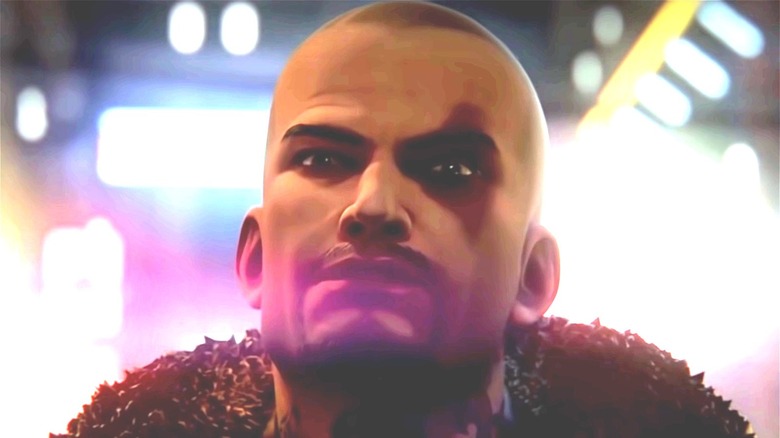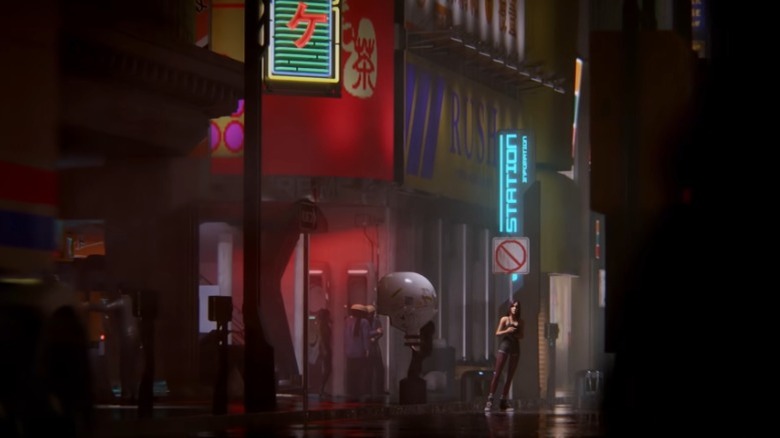Where Does Blade Runner: Black Lotus Fit Into The Blade Runner Universe?
The cyberpunk aesthetic that was codified by Ridley Scott's "Blade Runner" drew a lot of inspiration from anime, so it makes sense that the franchise is now circling back to anime as the de rigueur medium for its newest stories. Following the immensely successful "Blade Runner 2049" tie-in short "Blade Runner: Black Out 2022" — which was directed by the legendary Shinichiro Watanabe ("Cowboy Bebop") — Alcon Entertainment is putting out a whole 13-episode anime series that has been billed as a sequel to "Black Out."
But is that actually what it is? As we have known for some time, "Blade Runner: Black Lotus" is centered on a wholly new replicant character and will not follow the events of "Black Out" directly, instead jumping forward a few years. In fact, to better understand exactly where "Black Lotus" fits within the rich tapestry of the "Blade Runner" universe, we have to go all the way back to the start of the notoriously intricate timeline to place the show within the context of the events depicted or referenced in "Blade Runner," "Black Out," and "Blade Runner 2049."
The Blackout ended — and started — it all
The original 1982 "Blade Runner" takes place in 2019 on a dystopian Earth where the mighty Tyrell Corporation has long been producing replicants for use as slave labor in space colonies, only to see them outlawed in the wake of an uprising. The plot of the film concerns a group of maverick replicants who escape to Earth and wreak chaos in Los Angeles while on a desperate quest to have their lifespans extended, and the titular agent who's sent to hunt them down.
The short that "Black Lotus" is based upon, "Blade Runner: Black Out 2022," is set three years after that and introduces a major event that causes a ripple effect on the universe of "Blade Runner": the Blackout. In the short, replicants Iggy (Jovan Jackson) and Trixie (Luci Christian) and technician Ren Dus (Bryson Bauguss) take up the rebellious mantle of Roy Batty (Rutger Hauer) by carrying out an elaborate plan to detonate a nuclear warhead in the stratosphere over Los Angeles, thus wiping out all the world's transmission of electronic data. Then, they blow up the Tyrell Corporation's server farms, effectively destroying all available information about the world's replicants and their whereabouts.
The rise of the Wallace Corporation
Per the official "Blade Runner 2049" timeline published on the movie's website back in 2017, replicant production was outlawed one year after the Blackout, with the short-lived Nexus-6 replicants being left to expire naturally at the end of their four-year lifespans, and Nexus-8 replicants either getting "retired" or going into hiding. At the same time, the Blackout had two major immediate effects on the world. The first was the ruin of Tyrell Corporation, deprived of nearly all its assets. The second was the subsequent deflagration of utter economic chaos worldwide, bringing with it industrial collapse and widespread hunger, as most of the world relied on the technologies supplied by Tyrell to function properly.
It was in that power vacuum that another, even shadier corporation rose: the Wallace Corporation, led by the terrible Niander Wallace (Jared Leto in the movies, Wes Bentley in "Black Lotus"). Initially known for the genetic engineering of more plentiful food crops, the Wallace Corporation experienced explosive growth as humanity's "solution to world hunger." Then, Wallace purchased the remains of Tyrell and hatched a plan to bring back replicant production by engineering the Nexus-9, a more docile and obedient line of synthetics, setting up the plot of the theatrical sequel "Blade Runner 2049."
Blade Runner: Black Lotus is set in the aftermath of both these events
The Blackout takes place in 2022, changing the face of Los Angeles for good. As per the official timeline, the prohibition of replicant production becomes official in 2023, and Niander Wallace has his big breakthrough in 2025. "Blade Runner: Black Lotus," meanwhile, takes place in Los Angeles in 2032 — just a few years before Wallace is to introduce the Nexus-9 line to the world, leading to the decriminalization of replicant production. This means that the series will explore the aftermath of the Blackout on both local and worldwide levels — a crucial undertaking when you consider that the calamity and its ramifications have never been directly depicted in either of the two "Blade Runner" theatrical feature films.
Through the story of Elle (Jessica Henwick), a young amnesiac woman who's trying to put the pieces of her past together, "Black Lotus" will also explore what it means to be (or not be) human in a world where replicants have been forced into clandestine, threadbare lives. And with Niander Wallace and his father Niander Wallace Sr. (Brian Cox) as major characters, the show will also take a look at the process by which the Wallace Corporation came to secretly revive the production of replicants to make the Nexus-9.
If you're curious about how Elle's story will dovetail with the story of the Wallace Corporation, well, all you gotta do is watch "Blade Runner: Black Lotus" when it premieres on November 14, 2021, on Adult Swim's Toonami and Crunchyroll.



